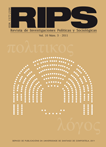Los mitos de gran alcance social: el caso boliviano en la visión de sus intelectuales progresistas
Contenido principal del artículo
Resumen
Desde una perspectiva racionalista, que hoy aparece como anacrónica ante la popularidad de posiciones relativistas y postmodernistas, se intenta analizar las grandes leyendas sociales bolivianas acerca de los recursos naturales y la Revolución Nacional de 1952. En la visión colectiva en torno a los recursos naturales, Bolivia aparece como un país potencialmente riquísimo, cuya pobreza actual sería la obra de pérfidos agentes externos y élites antipatrióticas. Algo similar ocurre con la exagerada importancia atribuida a la Revolución Nacional. La fortaleza de los mitos sociales reside en que estos comparten los prejuicios colectivos mejor.
A rationalist perspective appears today as anachronistic because of the popularity of relativist and postmodernist approaches. Nevertheless such a perspective is important in order to analize Bolivia’s largely spread social legends about natural resources and the so-called National Revolution of 1952. According to the collective legend on natural resources, Bolivia is perceived as a potentially very rich country, whose actual poverty is due to the perverse work of foreign factors and unpatriotic elites. Something similar occurs with the exaggerated relevance granted to the National Revolution. The strength of social myths lies in the fact that the myths share the well-rooted social prejudices of the Bolivian population.
Palabras clave:
Detalles del artículo
Artículos más leídos del mismo autor/a(s)
- H.C.F. Mansilla, El marxismo tercermundista y la ideología de la modernización acelerada. El aporte de René Zavaleta Mercado a la formación de un marxismo autónomo , RIPS: Revista de Investigaciones Políticas y Sociológicas: Vol. 14 Núm. 2 (2015)






